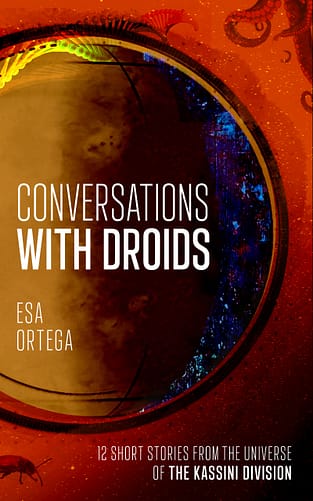Invasion Of The Bodysnatchers is my favourite SF story. Day by day, its main thesis – that we’ve all been replaced by emotionless simulacra who look, sound and think alike – becomes less of a sci-fi idea and more of a prediction.
An example: a number of podcasts I’ve heard recently featured authors arguing about the specific entry requirements for certain subgenres of science fiction… ‘It’s only space opera if the following criteria apply,’ etc, etc. As a sci-fi fan first and foremost, I’ve always thought when it comes to speculative fiction, it feels counterproductive for authors to patrol and police genre lines in this way.
Surely, by its very nature, sci-fi should be given a bit of leeway when it comes to conforming precisely to a preformulated set of conventions? After all, science fiction has a duty to be imaginative and to explore beyond the frontiers. And yet, furious discussion arises over which category a work fits into… and some readers will only read one particular genre, just as some writers will deliberately ‘genre-ify’ their work in order to cater for them, and only them.
Maybe this kind of gatekeeping thinking arises from writers who are concerned with pushing the buttons of their target markets for more profit, engaging their readerships through ever more defined and narrow parameters. Yet surely a good story should still prevail, regardless of what box it fits into? And can’t readers or viewers or players like things that fit into more than one box, or don’t fit neatly into any of the existing boxes at all? Am I still allowed to like Red Dwarf and Solaris equally, but for different reasons? (Yes, I am).

The danger of this reductive line of thought is that in subscribing to narrow rules and insisting on inflexible criteria for our enjoyment of something, we hasten the day when the algorithm has dominion over our waking lives, even our dreams. Everywhere we scroll nowadays, our entertainment is being filtered to us through crowd-based rating systems. The machines are feeding the data back to their masters, while their masters are tweaking the formulas and sending the results back through the machine. When it comes to content creation, the tail will eventually wag the dog. The mass market and the tide of opinion will begin to blindly define the boundaries of innovation, and eventually even the desire for it will disappear. Look how far along the line music is already.
The inevitable result? Entertainment becomes so formulated, characters so archetypal, ideas so bound by the straitjacket limitations of genre, that as readers, we won’t have any choices left to make.

It’s happening already, particularly in the world of ebooks. ‘This book is like that book crossed with that book,’ the ads tell us. How many Kindle books use the same title fonts on their covers – ‘the font that sells’? Some genres are succumbing more rapidly than others; how many identikit thriller covers have a silhouette of someone’s back, walking into a scene? How many book descriptions use the same ‘proven’ emotional trigger words? All these techniques, simple and overused though they may be, continue to work, continue to sell more books.
As courses teaching the formulas for writing success become the gospel for more and more aspiring writers, their advice often encourages authors to adhere to the whims of the algorithm and celebrate regression toward the mean, as though that was the ultimate goal of putting pen to paper. Originality is discouraged in favour of creating a close variation on techniques like those above: versions of what has been demonstrably tried and trusted. ‘Successful’ writing becomes a numbers game, a competition based on who can play the system to extract the most profit.
These cookie-cutter marketing formulas that are currently being applied to our art are evidence of a reductive trend that threatens to strip us of our cultural imagination. At the end of the line is a world where AI-generated music, AI-generated books and AI-generated companionship are commonplace. It always seems a long way off, until it’s here.
Of course, with countless lifetimes’ worth of content swarming and multiplying on the invisible machineries behind our screens, we are still faced with a problem. How to choose what to read, play, watch and to consume?
Category, genre, reviews, word-of-mouth and ratings become our filters. But we live in what Herbert A. Simon called an ‘attention economy’: “where a wealth of information creates a poverty of attention.” As we sift through more and more stuff, we demand less of our filters. We become less open-minded and take less persuading; criticism is reduced to the point where sheer weight of numbers and the law of averages become the deciding factors. We make snap decisions: how many of us have dismissed an interesting-sounding Netflix show because it only received an average of five-point-something? At that point, we’ve made the least-sophisticated decision we can make. Did the majority of the audience like it? If not, move on.
A feedback loop begins – the crowd flocks to the popular, the content creators mimic the popular to catch the attention of the crowd. This might all be acceptable if the ratings systems that evidently decide what becomes popular could be fully trusted and weren’t being manipulated in the name of profit, but you strongly suspect they aren’t. Uncritically relying on quantitative rather than qualitative data makes us complicit in the race to the bottom.

How in space is this ranting at all relevant here? Well, in the space-opera universe of The Kassini Division (which is set is 2889), humanity has had centuries to game these trends and others like them to their logical conclusions and has essentially retreated to a position of ‘deliberate species sovereignty’. The humanity of the 29th-century Federation has drawn a line in the sand that technologies and cultural shifts such as post-humanism, autonomous artificial intelligence, augmented biology and DNA manipulation, consciousness transference, virtual reality and more are forbidden to cross. Consequently, though these technologies are developed to a point and exploited for their obvious utility, humanity’s essence is ultimately preserved.
Hence, AI is inhibited from reaching the point of singularity, where it may become self-aware enough to wipe us all out in Cyberdyne Systems style; virtual reality doesn’t replace experience, it merely augments it; the old forms of media (TV, radio, internet – even good old books) still live on, in perfected and refined formats.
I’ll gladly plead guilty to accusations of laziness here – by remixing today’s familiar technologies, I don’t actually have to think of any new ones to replace them. Although I’d also say in my defence that as technology evolves to the point where it threatens to fundamentally alter the course of our own species’ evolution, we are going to have to make a decision about how much change is desirable. I figure that over the next few centuries, mistakes will be made, evolutionary dead ends will be pursued and undesirable pathways will be taken… and only once the error of our ways is made manifest will we regulate technology to defend that which we consider is essentially human.
Art is a culture’s way of explaining itself to itself. A way of experiencing one’s self in relation to the universe. Once it becomes controlled by a series of narrow formulas, what room will there be to resist?
That’s when the pod people will take over.

